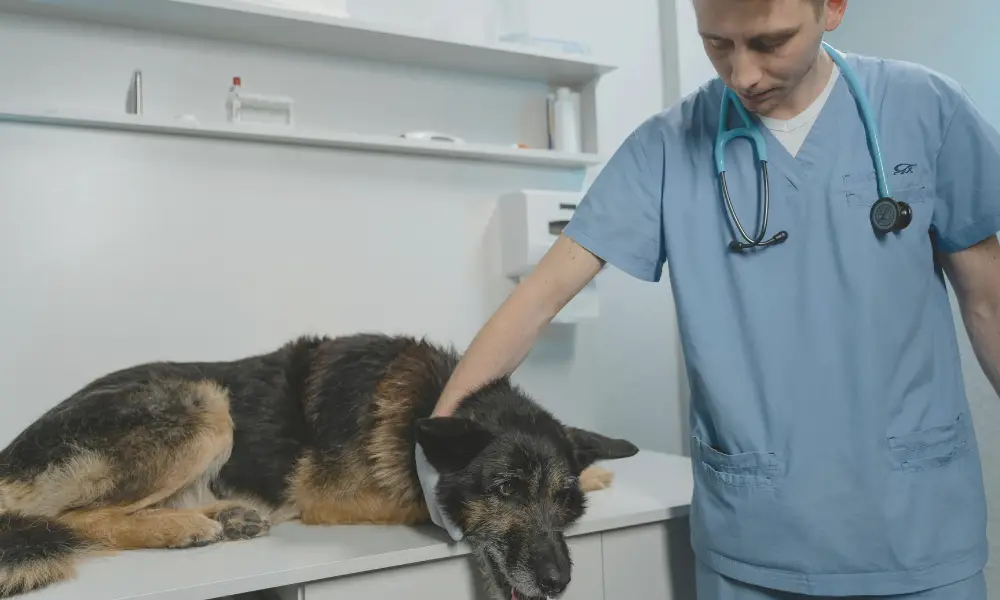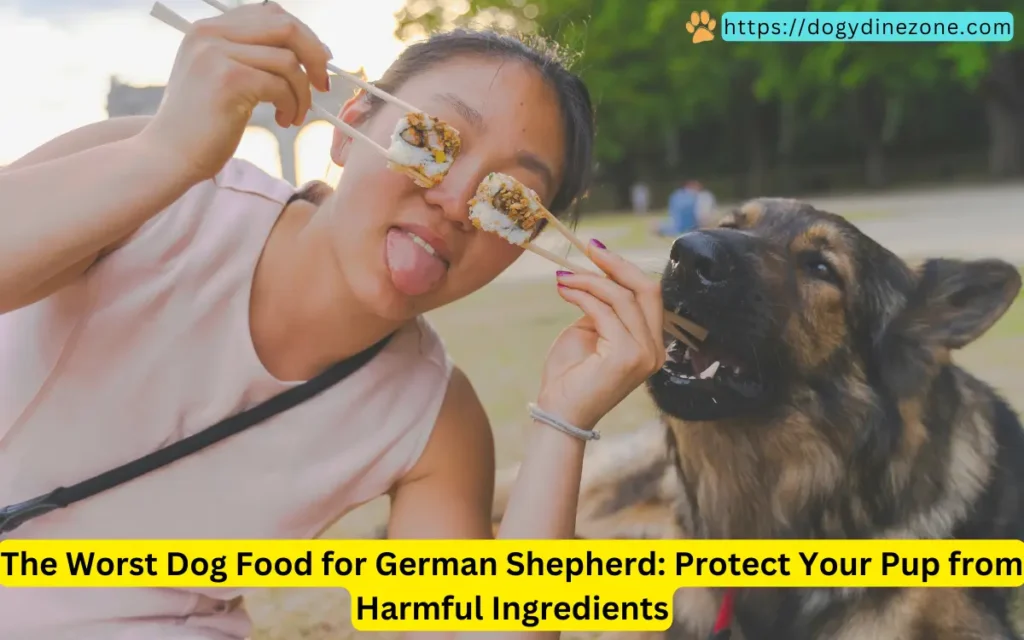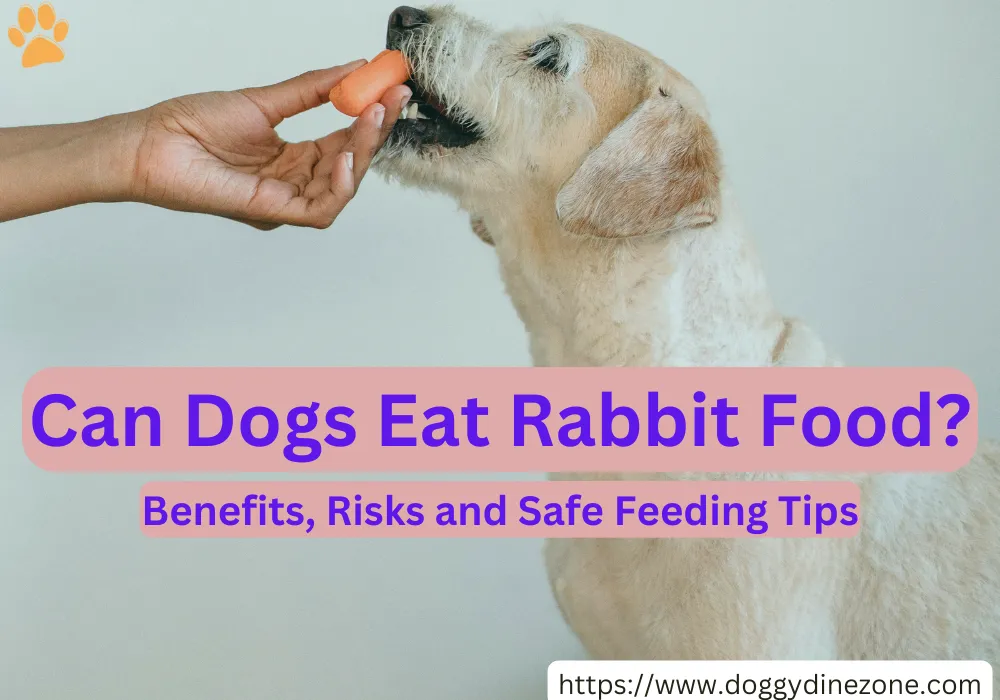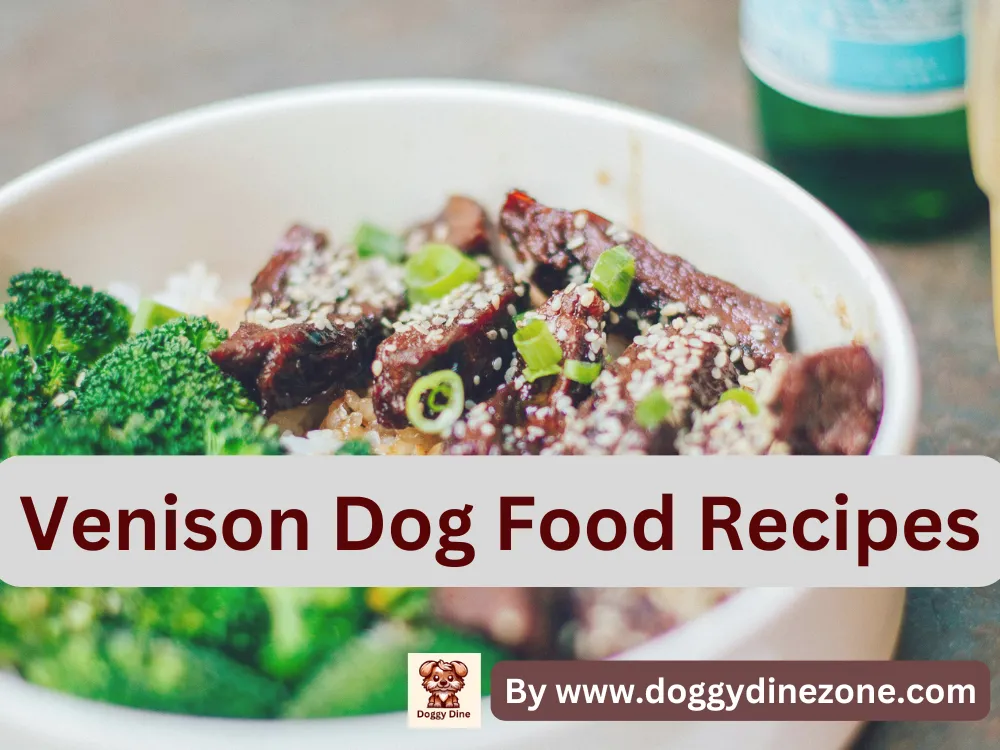The worst dog food for German Shepherd can cause serious health issues. These intelligent and loving dogs deserve the best, but many dog foods aren’t unsuitable. Poor-quality food is one of the common dietary mistakes for German Shepherds, which can result in weight gain, digestive problems, and even a shorter lifespan.
In this article, we’ll discuss why some foods are harmful, what to watch out for, and how to make better choices to keep your furry friend happy and healthy for years.
7 Dog Food Mistakes That Harm Your Shepherds’ Health

1. Cheap Generic Dog Foods
Typical dog-feeding mistakes include “bargain” brands you find in big bags at the grocery store. These brands are cheap because they’re full of fillers like corn, wheat, and soy. These ingredients have no nutritional value and can cause allergies or stomach upset.
Why Avoid?
- Low protein content
- High in carbohydrates
- Made with artificial flavors and preservatives
2. Dog Foods with Meat By-Products
Meat by-products sound fancy, but they’re just leftovers. This can include bones, organs, and even feathers. There’s no real nutrition here, and it’s not what your pet needs.
Why Avoid?
- Poor quality protein
- Hard to digest
- Can contain harmful chemicals
3. Foods High in Artificial Ingredients
Avoiding low-quality dog food brands is essential because many add artificial colors or flavors to improve the food’s appearance or smell. These additives can lead to allergic reactions and long-term health issues.
Why Avoid?
- Allergies and skin problems
- Upset stomach
- No nutritional value
4. High-Fat, Low-Quality Foods
Fat is essential in a dog’s diet, but the worst food for German Shepherd health can lead to weight gain and pancreatitis. Many low-quality brands use cheap fats that do more harm than good.
Why Avoid?
- Weight gain
- Risk of diabetes
- Poor coat condition
5. Foods with Grain as the Main Ingredient
While some grains can be okay in small amounts, foods with corn or wheat as the first ingredient are bad. These are fillers that provide no nutrition and can cause allergies.
Why Avoid?
- Allergic reactions
- Digestive issues
- Lack of energy
6. Unbalanced Home-Cooked Meals
Yes, you can feed your dog homemade food, but it has to be balanced. Many people make the mistake of giving their German Shepherds plain chicken and rice without adding the vitamins and minerals they need.
Why Avoid?
- Nutritional deficiencies
- Poor bone and joint health
- Weakened immune system
7. Dog Foods with Too Much Salt or Sugar
Some dog foods, especially treats, are loaded with salt or sugar.
Why Avoid?
- Risk of high blood pressure
- Diabetes
- Kidney problems
Warning Signs of Worst Dog Food For German Shepherd
Before we get into the worst offenders, here are some of the worst dog foods for German Shepherd that might not be good for your pet:

- Low-Quality Ingredients: Look for whole foods, not fillers like corn or wheat.
- Too Many Additives: Artificial colors, flavors, or preservatives can be harmful.
- Low Protein Content: German Shepherds need high protein for their active lifestyle.
- High in Fat and Salt: These can lead to weight gain and other health problems.
- No Specific Meat Source: Avoid foods that list “meat by-products” instead of real chicken, beef, or fish.
- Lack of Vitamins and Minerals: Essential nutrients keep their coat shiny and bones strong.
- Grain Overload: Too much grain can upset their stomach and cause allergies.
Safe vs Unsafe Foods for Your Dog: What to Feed for Optimal Health
| Safe Foods | Unsafe Foods |
|---|---|
| Chicken (cooked, boneless) | Chocolate |
| Carrots, Grapes, and raisins | Rice Onions and garlic |
| Apples (no seeds) | Xylitol (sugar-free gum) |
| Pumpkin | Alcohol |
How Bad Dog Food for German Shepherd Can Harm
The impact of diet on German Shepherd health can lead to serious health issues, including:
- Obesity: Too many calories or too much fat can cause weight gain.
- Joint Problems: Bad food doesn’t support healthy joints, leading to issues like hip dyspepsia.
- Allergies: Low-quality food can cause itchy skin, ear infections, and more.
- Digestive Issues: Fillers and artificial dog food labels and ingredients can upset their stomach.
- Shorter Life Span: Poor diet can lead to chronic health conditions that decrease the length of life.
What to Do If Your Dog Eats Something Harmful: Quick Safety Tips
Quickly act if your German Shepherd is consuming insalubrious food. They usually get sick due to the consumption of toxic material. First, be calm and find out what material your dog has eaten. Some foods are anathema to dogs, like Chocolates, Grapes, Onions, or Artificial Sugars. If you are unaware of what your pet has consumed, the best practice is always to call the vet.
He will let you know whether you should immediately take the dog to the vet or wait. Do not try to make your pet vomit unless the vet says it is correct. Tell him what your dog ate, how much, and when it happened.
Perhaps sometimes they need special medicine or management to get things in order immediately. Just be vigilant of what symptoms they throw up, such as runny feces and abnormal behavior when consuming harmful things.
Healthy Meal Choices for Your Dog: Nutrient-Rich Options for a Happy Life

- Pure Meat: Chicken, beef, lamb, or fish as leading ingredients
- Healthy Fats: Fish oil and flaxseeds for a silken coat
- Whole Grain or Vegetables: Brown rice, sweet potatoes, or carrots
- No Additives: Avoid foods containing artificial colors, flavor enhancers, or preservatives
This is an example of a good diet:
- Protein: Around 30% or more
- Fat: 10-15%
- Carbohydrates: Low and must come from natural sources.
- Vitamins and Minerals: Strong Bones and Healthy Immunity
Conclusion
The worst dog food for German Shepherd can cause big health problems, so it’s important to pick the right food. These dogs need good food to stay happy and healthy. By choosing the right food without harmful ingredients, we hope you have the answer to avoid feeding mistakes for dogs and support pet health with better nutrition.
Always check the labels for long-term benefits and avoid health issues through a proper canine diet. If you’re unsure, ask your vet. Taking care of what your dog eats helps them live a long, happy life!
FAQs
1. Why is feeding the worst dog food for German Shepherd so dangerous?
If you feed your German Shepherd low-quality food, he can start gaining weight, get allergies, and have digestion problems that can increase his lifespan and affect his overall mood. Why should I avoid overeating food if it does not consume healthy food?
2. What are the ways by which I can determine the nutrition of my German Shepherd, who consumes terrible food?
Weight gain, upset stomachs, and skin issues are some of the telltale signs of a German Shepherd casually eating food. There is more to determining the risks as well as prevention.
3. Which food items should I avoid while feeding German Shepherds?
For a healthy life, one should avoid corn, wheat, meat by-products, and artificial additives. Low Nutritional requirements for large breed dogs indicate that they would negatively affect health. Learn to Identify harmful ingredients in dog food for safety.
4. How can I go about feeding my German Shepherd more healthily?
Switching your dog’s normal food involves a gradual change to avoid stomach problems. Learn how to introduce new options in terms of absorption into a controlled program for shifting your German Shepherd into the best energy food.
5. Can bad food reduce my German Shepherd’s life?
A normal beginning in life can develop into obesity and joint diseases, which are signs of poor nutrition in dogs. Studies also provide the key to enhancing the life of your German Shepherd in a longer and healthier way.
About the Author
I’m James Leo, a canine nutrition expert and pet wellness advocate with a passion for helping dog owners make informed, science-backed decisions about their pets’ health. With years of experience in dog food formulation, breed-specific diets, and veterinary care, I specialize in creating research-based guides and tools that improve the lives of dogs and their families.
At DoggyDineZone.com, I’ve played a key role in developing accurate dog dosage calculators, ensuring that pet owners can safely administer medications and supplements tailored to their dog’s unique needs. My work is backed by collaborations with licensed veterinarians and canine nutritionists, blending practical experience with the latest scientific research.
I believe that every dog deserves a healthy, balanced diet, and I’m dedicated to simplifying complex nutrition science into clear, actionable advice. Whether you’re looking for homemade dog food recipes, breed-specific meal plans, or expert guidance on pet supplements, my goal is to provide reliable and easy-to-follow resources that empower dog owners.
I stay updated with the latest veterinary and pet nutrition research by engaging with industry leaders and participating in ongoing education. My approach is simple: help pet owners make confident, well-informed choices for their furry companions.
🔹 Medical Disclaimer: The content I provide on DoggyDineZone.com is for informational purposes only and should not replace professional veterinary advice. Always consult a licensed veterinarian regarding your pet’s health and care.
Through my work, I aim to be a trusted voice in canine nutrition and pet care, helping dog owners give their pets the best possible life.





Pingback: How to Avoid Storage Mites in Dog Food: Reducing Allergies
Pingback: Can Dogs Eat Rabbit Food? Expert Tips & Health Advice